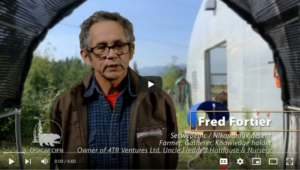Food Sovereignty and Secwepemctsín Values
Food Sovereignty
Food sovereignty is a powerful concept, and one that is at the centre of this guide. “When communities are free to shape their own food systems, food can be a vehicle to justice, health and sustainability to all” (Seed Change). By collecting and sharing knowledge from producers growing in Secwepemcúl̓ecw, we can empower the next generation of farmers to take care of the land, grow and share good food, and be more resilient in times of climate and political changes. We can learn from Elders who have decades of collective growing knowledge, learn from their mistakes, and create more sustainable and resilient farms.
The six pillars of Food Sovereignty were defined by farmers at the International Forum for Food Sovereignty in Nyéléni, Mali, in 2007, and a seventh pillar was added by members of the Indigenous Circle during Food Secure Canada’s People’s Food Policy process.
- Focuses on food for people – Food is more than a commodity. People’s need for—and right to—food must be at the centre of policies.
- Builds knowledge and skills – We need to build on traditional knowledge, using research to support this knowledge and pass it to future generations. We also need to reject technologies that undermine or contaminate local food systems.
- Works with nature – We need to optimize the contribution of ecosystems and improve resilience through the use of diverse agroecological production and harvesting methods that and improve ecosystem resilience and adaptation, especially in the face of climate change.
- Values food providers – We need to support sustainable livelihoods for farmers and everyone else involved in food production or harvesting, and we need to respect their work.
- Localizes food systems – We need to reduce the distance between food providers and consumers, to reject dumping and inappropriate food aid, and resist dependency on remote and unaccountable corporations for food and seed.
- Puts control locally – We need to place control over food systems in the hands of local food providers and reject the privatization of natural resources. We also need to recognize the need to inhabit and share territories.
- Food is sacred – Food is a gift of life, not to be squandered. It cannot be commodified.
Food Sovereignty in Secwepemcúl̓ecw
Further to these international pillars, Fred Fortier (Uncle Freddy’s Hothouse) identified these four important elements of food sovereignty in Secwepemcúl̓ecw:
- Water sovereignty – We need access to free, good water to grow crops and animals. If you are paying for expensive water or it is not clean, your operation will not be sustainable. Find a property with access to good water that you can use at an affordable rate.
- Seed sovereignty – We need control over our seeds. Sourcing local seeds or saving your own will produce crops that are more resilient to changing climatic conditions.
- Land sovereignty – We need access to communal land to build strong communities; in those shared spaces where everyone has emotional and physical safety, we can teach others how to grow food, how to prepare food, and heal from historical trauma.
- Social sovereignty – There is a history of forced labor in residential schools, and many Indigenous people don’t want to farm today. Part of this healing that we can work towards is understanding our history, listening to and sharing knowledge from Indigenous producers, and supporting those Indigenous producers. This support can come from Bands, customers, and peers purchasing produce grown by local farmers.
- Fred Fortier’s Video
- Scan QR code to watch
Secwepemctsín Values and Language
There is an overarching value of reciprocity in Secwépemc culture which is evident in the Secwepemctsín language. Here are some examples:
- Metwécw – Sharing food
- Yecwemenul’ecwu – Caretakers of the land (referring to the role and responsibility of Secwépemc people as caretakers)
- Knucwetwécw – Working together, cooperating, helping one another.
These words are from: “Eating Our Culture”: Intersections of Culturally Grounded Values-Based Frameworks and Indigenous Food Systems Restoration in Secwepemcúl̓ecw by Libby Jay Chisholm.


